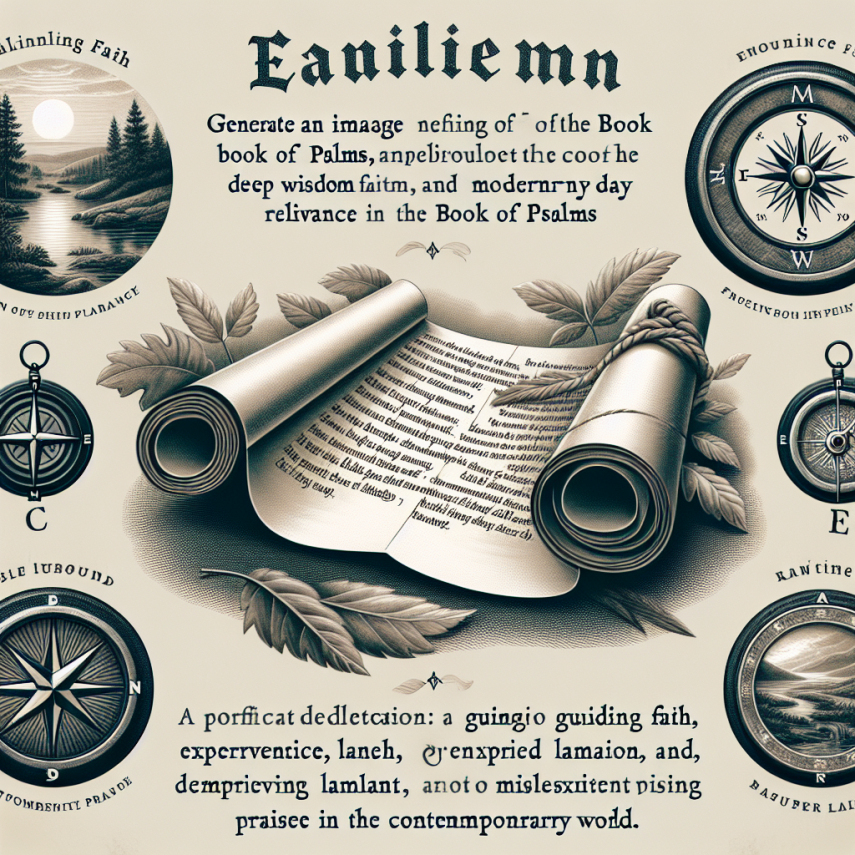Exploring the Depths of the Book of Psalms: A Journey of Faith, Lament, and Praise
The Book of Psalms, nestled at the heart of the Bible, is a treasure trove of spiritual wealth that transcends the boundaries of time and culture. As an individual steadfast in my exploration of faith amidst the complexities of the modern world, I’ve consistently found solace, guidance, and profound wisdom within the ancient texts of Psalms. This collection, comprised of prayers, songs, and poems, encapsulates a wide range of human emotions—from deepest despair to exuberant joy. Here, we delve into the significance, themes, and timeless relevance of the Psalms, inviting readers to discover its treasures anew.
< >
>
Background and Significance
The Book of Psalms, or ‘Tehillim’ in Hebrew, is a foundational component of both Jewish and Christian liturgies, composed over several centuries. Its 150 chapters offer a mosaic of responses to God’s revelation and His covenant with humanity. Historically, the Psalms were attributed to various authors, including King David, Solomon, Asaph, and others, reflecting the collective spiritual heritage of God’s people.
< >
>
Key Themes and Insights
Faith Amidst Struggle
One dominant theme in the Psalms is the struggle of faith against doubt and adversity. My personal journey mirrors this, as I’ve navigated challenges ranging from entrepreneurship to battles with illness. Psalms like 23 and 121 resonate deeply, reminding us that God is our shepherd and helper even in the darkest valleys.
Praise and Worship
The call to praise regardless of circumstances stands out. Psalms uniquely integrate worship into every aspect of life, teaching us to see God’s hand in creation, history, and our personal stories. Such praise is vividly captured in Psalm 150, urging everything that has breath to praise the Lord. This perspective has encouraged me to embrace gratitude and worship as daily practices.
< >
>
Lament and Confession
Psalms don’t shy away from expressing despair, confusion, or anger towards God. They embody the act of lament—a candid pouring out of one’s heart, as seen in Psalm 22. Similarly, in overcoming personal and professional trials, I’ve learned the importance of laying bare my frustrations before God, finding, in return, His unfailing love and mercy.
Wisdom and Guidance
The Psalms are rich in wisdom, offering guidance for righteous living. They present a stark contrast between the path of the wicked and the way of the righteous, with the promise that God watches over the path of the just. In integrating my faith with my career, passages like Psalm 1 have served as a moral compass, prompting me to seek integrity and purpose in my endeavors.
Theological Implications and Contemporary Relevance
Theologically, the Psalms reflect on the nature of God as both immanent and transcendent. They reveal God’s closeness to His creation, His compassion, and His sovereignty over the world. This dual revelation has shaped my understanding of God’s character, especially in recognizing His presence in both the mundane and the magnificent aspects of life.
In the context of modern faith and societal challenges, the Psalms offer a blueprint for authentic spiritual expression. They inspire us to engage with our world justly and compassionately, echoing themes from previous articles like “Understanding the Book of Psalms: A Guide to Faith, Lament, and Praise” and “Faith in Navigating Grief: Finding Hope and Solace in Christ Through Loss”, which underscore the Psalms’ relevance in addressing addiction, grief, and family dynamics within a Christian framework.
Conclusion and Reflection
The Book of Psalms invites us into a deeper, more authentic relationship with God, highlighting the power of faith, the importance of lament, and the unending reasons we have to offer praise. As we reflect on its timeless wisdom and rich theological insights, may we be encouraged to incorporate its lessons into our daily lives, finding in its verses the strength to face challenges and the inspiration to live in harmony with our beliefs.
For further reflection on the intersection of faith and contemporary challenges, consider exploring related topics like the role of Christian community, the application of biblical teachings in modern life, and the pursuit of social justice through a faith-based lens.
<
>
Focus Keyphrase: Book of Psalms in modern faith




Hello, David. This is Micah Robinson from Virginia Beach. First off, thank you for this thoughtful piece. As someone who has seen the darkest sides of humanity and struggled with the aftermath, I’ve found my own solace in the Psalms during trying times. Your insights on lament and confession resonate deeply with me—acknowledging our suffering before God is a powerful step towards healing. However, I’m curious about your thoughts on the Psalms in the context of war and peace. In my work with veterans, interpreting faith in the context of such experiences is a recurrent theme. How do you see the Psalms speaking into this, especially in light of modern conflicts? Appreciate your work, Micah.
Greetings, readers! David M here. I penned this article to shed light on the rich spiritual heritage encapsulated in the Book of Psalms. In today’s fast-paced and often tumultuous world, Psalms remain a source of comfort, guidance, and hope, bridging the gap between ancient wisdom and contemporary faith challenges. Whether you’re wrestling with doubt, seeking solace, or celebrating life’s joys, I believe Psalms has something to offer everyone. I invite you to explore this article and reflect on the enduring significance of these biblical poems for your spiritual journey.